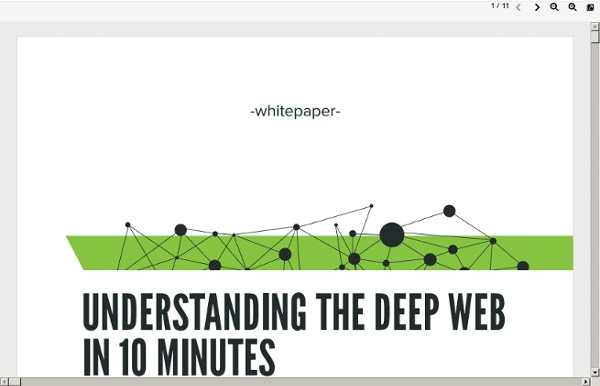



10 Search Engines to Explore the Invisible Web Not everything on the web will show up in a list of search results on Google or Bing; there are lots of places that their web crawlers cannot access. To explore the invisible web, you need to use specialist search engines. Here are our top 12 services to perform a deep internet search. What Is the Invisible Web? Before we begin, let's establish what does the term "invisible web" refer to? Simply, it's a catch-all term for online content that will not appear in search results or web directories. There are no official data available, but most experts agree that the invisible web is several times larger than the visible web. The content on the invisible web can be roughly divided into the deep web and the dark web. The Deep Web The deep web made up of content that typically needs some form of accreditation to access. If you have the correct details, you can access the content through a regular web browser. The Dark Web The dark web is a sub-section of the deep web. 1. 2. 3. 4. 5. 6. 7. 8. 9. 10.
Google, Apple, Microsoft i Mozilla podkręcą szybkość działania przeglądarek dwudziestokrotnie Ciekawe rzeczy się dzieją na rynku przeglądarek internetowych. Giganci branży łączą siły i zamierzają znacząco podnieść szybkość działania programów tego typu. A wszystko to dzięki WebAssembly, zupełnie nowemu formatowi binarnemu do kompilowanie stron i aplikacji sieciowych. Obecnie w internecie niepodzielnie rządzi JavaScript. Z WebAssembly (wasm) jest inaczej. Zaangażowanie Google’a, Apple’a, Microsoftu i Mozilli wyraźnie sugeruje, że mamy do czynienia z rozwiązaniem aspirującym do stania się powszechnie stosowanym standardem. Wdrożenie jednak potrwa. Zanosi się zatem na ciekawe zmiany w naszych przeglądarkach.
Cleverbot.com - a clever bot - speak to an AI with some Actual Intelligence? Google Class | Everything You Want To Learn About Google! Pubmed Najpopularniejsze wyszukiwarki - zestawienie - Rynek Informacji Większość użytkowników internetu nie korzysta z wielu wyszukiwarek, nawet jeśli takie znają. Przede wszystkim oczekują oni od wyszukiwarki, że: – podawać będzie wyniki, którymi są zainteresowani; – ma odpowiednio przejrzysty interfejs; – posiada narzędzia, które pozwolą na zawężenie wyników. Przedstawiamy listę wyszukiwarek, które spełniają potrzeby 99% użytkowników. DuckDuckGo.com Na pierwszy rzut oka, wyszukiwarka ta wygląda jak Google. Google Scholar Google Scholar to specjalna wersja Google, która z pewnością przyda się przy niejednym sporze naukowym. Jeśli szukasz informacji, które masz zamiar wykorzystać w specjalistycznej dyskusji, to zapomnij o zwykłym Google. Ask.com Ask.com to weteran jeśli chodzi o wyszukiwarki WWW. Bing Bing to próba Microsoftu na przełamanie monopolu Google. Mahalo Mahalo to ‘ludzka’ wyszukiwarka, która działa dzięki społeczności ‘edytorów’, którzy ręcznie przeszukują setki tysięcy stron. Dogpile.com Yippy Yahoo! Yahoo! Google Autor: Jan Lisowski
Zaawansowane operatory Google Duża część Polaków korzysta codziennie z wyszukiwarki Google. Niewiele jednak osób wie, że często najlepsze i najbardziej odpowiadające naszym oczekiwaniom rezultaty można otrzymać używając kilku zdefiniowanych przez deweloperów Google operatorów. Użycie tych poleceń często pomaga zawęzić wyniki wyszukiwania tylko do określonej domeny, do stron posiadających określony tytuł czy też zwierają te słowa w treści. Polecenie to pokazuje, jakie strony internetowe linkują do strony przez nas wskazanej np. link:www.pf.pl Polecenie to ogranicza wyszukiwanie do stron internetowych, które zawierają się w określonej domenie internetowej np. site:www.pf.pl adwokaci Polecenie to ogranicza wyszukiwanie do stron internetowych, które zawierają w tytule choć jedno z podanych słów np. intitle: darmowe konta email Polecenie to ogranicza wyszukiwanie do stron internetowych, które zawierają w tytule wszystkie wskazane słowa, np. allintitle: darmowe konta hostingowe np. inurl: adwokaci Warszawa np. intext: “www.pf.pl”
Punctuation, symbols & operators in search - Search Help There are different ways to filter your Google searches to be more precise or to expand in new directions. Advanced search Google offers pages designed to help you perform specialized web and image searches: Filters & topics After you perform a search, filter and topic buttons appear near the search bar. They may also appear in other places on the page. Filters Filters allow you to narrow results to a particular type, such as: Video News Images Web The "Web" filter contains text-based links to websites. The exact filters and the order in which they appear is dynamic. Topics Topics allow you to add terms to your query that can help you get more specific information or explore related information. Operators To narrow your results in specific ways, you can use special operators in your search. Search for an exact match: Enter a word or phrase inside quotes. Go to our blogpost for more information about how to search using quotes. Search for a specific site: Enter site: in front of a site or domain.